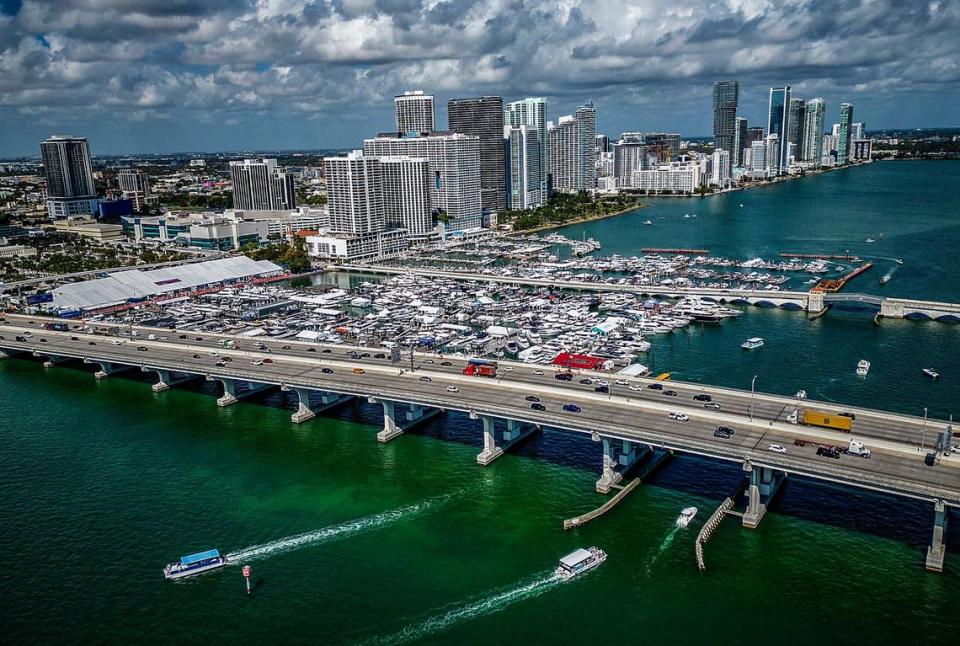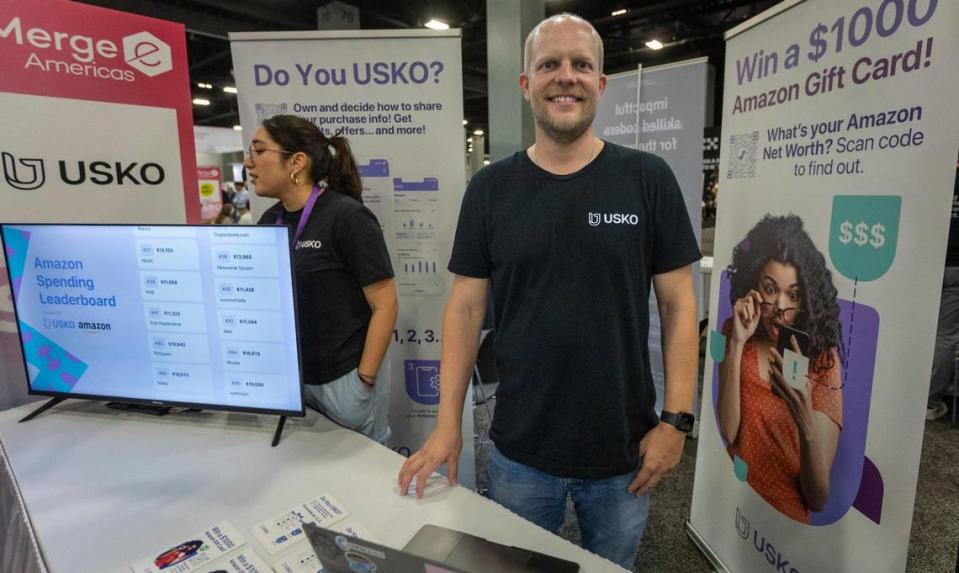Miami’s blossoming tech hub hits rough patch, as startup capital gets scarce
Juha Mikkola, founder of Usko Privacy in Miami, was talking to his technology startup’s early investors late last year when they cautioned him tough times await.
They told him the market was becoming much more challenging to raise funding, he recounted recently, and so startups needed to make cash they already had last a lot longer than previously planned. At that moment, “we realized we had to make changes,” the veteran tech entrepreneur said.
The company, which is developing a platform that allows users of Amazon to analyze and make money from their shopping history there, early this year cut its full-time and part-time payroll of seven. They also reduced the number of items on the product road map.
The immediate goal: to weather a stormy 2023. Now, after the adjustments, Mikkola said the company that started two years ago has bought itself time. “We’re not in a position that we have to raise capital this year.”
That’s a good thing because venture capital financing, which was plentiful last year in Miami, dried up in the beginning of 2023. In the first quarter, $243 million in venture capital was invested in the Miami metropolitan area, including Fort Lauderdale and Pompano Beach, and that’s less than one-tenth the amount during the same three-month period last year, according to data from research firm PitchBook.
The number of deals, 70, was roughly half of the total during the first quarter of 2022. Miami fell to No. 17 among metro areas nationwide for venture capital raised in the first quarter. That represents a steep drop from Miami’s seventh-place ranking In 2022.
“Times are tough,” said Anna Pietraszek, faculty fellow in entrepreneurship and innovation at the Pino Global Entrepreneurship Center at Florida International University.
Since the coronavirus pandemic hit in spring 2020, technology and finance professionals have flocked to Miami, in several cases from traditional startup hubs in Boston or Silicon Valley in California. Venture capital investment firms such as San Francisco Bay Area-born Atomic, Founders Fund and Andreessen Horowitz have set up shop here.
Exuberance reigned in 2022, when Miami posted an increase in amount of venture capital invested, contrary to the overall national trend. While the technology industry endured a global shellacking last year, Miami held its own. The city was different, excited newcomers and locals supporting or working in the blossoming tech ecosystem proclaimed.
Now, Miami’s startup scene is getting squeezed by national trends and looming economic threats. Venture capital funding nationwide fell in the first quarter, and notably, angel and seed investing fell by 53.1% to $3.3 billion compared to the beginning of last year, according to PitchBook.
The sluggish start of year here and nationally can be attributed to several factors. Certain economists and consumers worry of a coming recession. The Federal Reserve continues hiking interest rates to tackle inflation. And the failure of Silicon Valley Bank, which operated a branch in Brickell and included several Miami startups in its customer portfolio, had a spillover effect causing the costs of credit to increase. Therefore, venture capital firms have become more cautious about investing.
“Finance — especially VC [venture capital] — is fundamentally prospective, and when the invisible hand that writes the rules of the market is revising them without warning, investors tend to reduce their activity until they can see at least a rough draft,” according to PitchBook’s first quarter report co-authored with the National Venture Capital Association.
Newer tech hubs such as Miami tend to get hit the hardest, even if they continue to draw many newcomers.
Kaben Clauson was among the experienced tech entrepreneurs who moved to Miami since the pandemic emerged. He previously launched one startup in Chicago and was involved in another accepted into the prestigious Silicon Valley startup accelerator Y-Combinator.
But when the co-founder and CEO of Base, his third startup, began fundraising this January, he encountered resistance.
The startup is a kind of social network for people who want to meet in real life. It matches people across the region by interest in activities and promotes meeting in-person. It seemed promising given Miamians fondness for the outdoors and socializing.
Dramatic reversal
Yet, five investment firms with which he already had relationships told him they were not investing in new companies in the first quarter, Clauson said. While he had previously been told by venture capitalists to secure enough funding at one time to last 14 months, now they were telling him that companies should have enough capital to go 24 months.
“The fundraising environment has changed dramatically from a year ago,” Clauson said. “It’s one of the biggest drops [of capital available] I’ve ever seen.”
He and his two co-founders met and decided to make changes. They would focus on proving their business model as fast as they could and reduce the amount of capital they sought.
That is part of what many of the region’s investors are suggesting.
“Pretend you’re not going to get another dollar,” said Maria Derchi Russo, vice president of platform and community for the venture capital firm Florida Funders, describing the advice she gives entrepreneurs these days. “What do you need to do to sustain your company and grow it without the need of outside money?”
There is less to invest in new companies, she noted, because “a lot of funds are doubling down on their winners and trying to reallocate the dollars to ensure that they can survive.”
Salo Sredni, managing director at Ocean Azul Partners in Coral Gables, said startups “need to be very, very efficient with the capital they raise” and “need to better understand how much money they need.” In past years, startups often burned money “for the sake of burning money,” he said.
Sredni and his partners told their portfolio companies last year to make sure they have at least 18 to 24 months of capital under their belts.
Back in euphoric times — November 2021 — Mark Switaj, founder and CEO of Roundtrip Health, was only looking to raise $3 million to $5 million but took in $8 million instead.
Roundtrip Health is a Fort Lauderdale healthcare tech company that helps provide transportation to individuals being released from hospitals. Management sees such access a major factor that keeps people in the hospital for longer than necessary.
Switaj, had started Roundtrip in 2016 in Philadelphia and Richmond, Virginia, before he and his husband moved last year to South Florida.
“I’ve shut down conversations with investors because I know the market is so cold right now,” he said. “It’s not really worth my time.”
Similarly, Juan Manuel Barrero, founder of Miami-based Lazo, said, “We are not fundraising at this moment.”
The company provides a financial and legal platform for other startups, so they can do their accounting, payroll, and other tasks a chief financial officer would do.
Barreo said venture capitalists “used to invest more in the people or maybe in a PowerPoint. That’s not happening anymore for a first-time founder, not even for a second-time founder.”
An eye on efficiency
The market’s softness in the early going this year could bring benefits to Miami startups, forcing them to become more efficient, and learn how to get by with less.
Mikkola of Usko Privacy said the changes his company was forced to make has helped it become more selective in the products they develop. As of today, they are testing their technology on iOS and Google Play stores. “It’s out there and getting feedback,” he said, helping the firm get revenue faster.
Mikkola isn’t a novice tech bro. He’s an experienced member of Miami’s tech scene. He and his wife, Johanna Mikkola, founded digital skills training center Wyncode Academy in Wynwood in 2014. Brainstation acquired it in 2021.
For Barrero, this year Lazo is focused on improving economics, operations, and becoming more efficient, he said.
The company wants to be ready when the venture capital market eventually turns around.
For its part, Base, the social network, raised $500,000 last month. But leader Clauson said that was only possible because of the changes the company made in the previous two months. He said the realization of how the tough market is forced the business to get up and running faster, and get to near profitability much quicker.
“Had we not started to get some early great traction and revenue with the company, we never would have been able to raise any money in this environment,” he said.
The expectations of a venture funding recovery for Miami startups isn’t a matter of if but when, experts said, looking to the end of this year or early in 2024 for a rebound.
“I’m positive that we are going to recover in Miami,” FIU innovation fellow Pietraszek said. “People right now are looking at South Florida for what’s happening.”
And Miami’s tech scene still has its advantages.
People keep moving to South Florida from older tech hubs. Energy is abundant. The presence of Silicon Valley veteran venture capitalists like Founders Fund general partner Keith Rabois, who witnessed firsthand the first dot-com collapse in 2000, is helping remind folks that many successful companies have been built amid crises. Meanwhile, the old-timers here like the founders of eMerge Americas, the technology business networking company, are a reminder of what was built here when few in the national tech arena paid any attention to Miami.
eMerge drew thousands to its annual tech trade show, first held in 2014, Thursday and Friday in Miami Beach.
And the region’s connection to Latin America illustrates what can be created and built during turbulent times. In Brazil, for example, numerous fintech companies have prospered over the past decade despite in a nation with almost zero annual economic growth.
Smart ideas still draw investors
Perhaps most importantly, venture capital firms have money. With valuations falling, that could spur deals.
“There’s always money for great ideas and there are always people looking to fund entrepreneurship,” said Sredni of Ocean Azul Partners. “The question becomes at what valuation.”
To be sure, what’s not coming back is a return to the heady days of the past few years.
“Right now, a lot of founders, myself included, who thought we’ll just raise money on the idea, realize that we need a little more proof in 2023 than we did in 2022 to actually get capital raised,” Base CEO Clauson said.
“We’re going to see a lot more businesses being built on old-school business ideas like revenue, profitability, and gross margins versus really radical longshot ideas,” he said.
Switaj, a tech startup founder who also advises many other entrepreneurs, said his advice boils down to this.
“I am encouraging founders to bootstrap,” the Fort Lauderdale healthcare tech company operator said.



